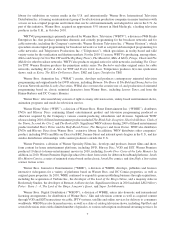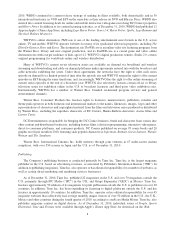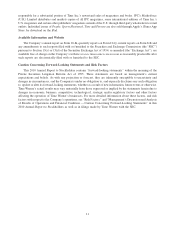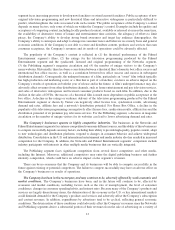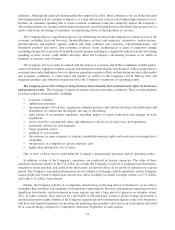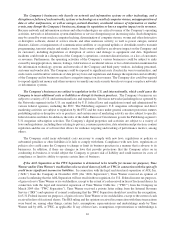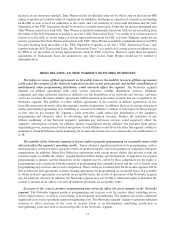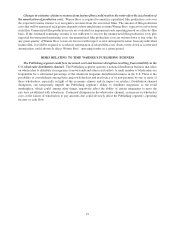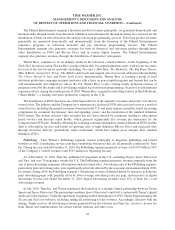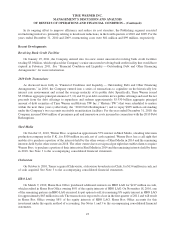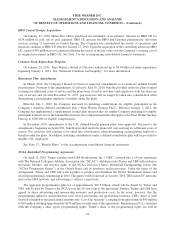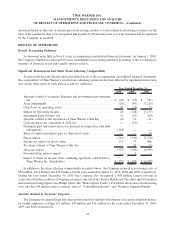Time Magazine 2010 Annual Report Download - page 28
Download and view the complete annual report
Please find page 28 of the 2010 Time Magazine annual report below. You can navigate through the pages in the report by either clicking on the pages listed below, or by using the keyword search tool below to find specific information within the annual report.The Company’s businesses rely heavily on network and information systems or other technology, and a
disruption or failure of such networks, systems or technology as a result of computer viruses, misappropriation of
data or other malfeasance, as well as outages, natural disasters, accidental releases of information or similar
events, may disrupt the Company’s businesses, damage its reputation or have a negative impact on its revenues.
Because network and information systems and other technologies are critical to many of the Company’s operating
activities, network or information system shutdowns or service disruptions pose increasing risks. Such disruptions
may be caused by events such as computer hacking, dissemination of computer viruses, worms and other destructive
or disruptive software, denial of service attacks and other malicious activity, as well as power outages, natural
disasters, failures or impairments of communication satellites or on-ground uplinks or downlinks used to transmit
programming, terrorist attacks and similar events. Such events could have an adverse impact on the Company and
its customers, including degradation or disruption of service and damage to equipment and data. Significant
incidents could result in a disruption of the Company’s operations, customer dissatisfaction, or a loss of customers
or revenues. Furthermore, the operating activities of the Company’s various businesses could be subject to risks
caused by misappropriation, misuse, leakage, falsification or accidental release or loss of information maintained in
the information technology systems and networks of the Company and third party vendors, including personnel,
customer and vendor data. The Company could be exposed to significant costs if such risks were to materialize, and
such events could result in violations of data privacy laws and regulations and damage the reputation and credibility
of the Company and its businesses and have a negative impact on its revenues. The Company also could be required
to expend significant money and other resources to remedy any such security breach or to repair or replace networks
or information systems.
The Company’s businesses are subject to regulation in the U.S. and internationally, which could cause the
Company to incur additional costs or liabilities or disrupt its business practices. The Company’s businesses are
subject to a variety of U.S. and international laws and regulations. Television networks (including those operated by
the Networks segment) in the U.S. are regulated by U.S. federal laws and regulations issued and administered by
various federal agencies, including the FCC. The Publishing segment’s U.S. magazine subscription and direct
marketing activities are subject to regulation by the FTC and the states under general consumer protection statutes
prohibiting unfair or deceptive acts or practices, and certain areas of marketing activity are also subject to specific
federal statutes and rules. In addition, the rules of the Audit Bureau of Circulations govern the Publishing segment’s
U.S. magazine subscription activities. The Company’s digital properties and activities are subject to a variety of
laws and regulations, including those relating to privacy, consumer protection, data retention and protection, content
regulation and the use of software that allows for audience targeting and tracking of performance metrics, among
others.
The Company could incur substantial costs necessary to comply with new laws, regulations or policies or
substantial penalties or other liabilities if it fails to comply with them. Compliance with new laws, regulations or
policies also could cause the Company to change or limit its business practices in a manner that is adverse to its
businesses. In addition, if there are changes in laws that provide protections that the Company relies on in
conducting its business, it would subject the Company to greater risk of liability and could increase its costs of
compliance or limit its ability to operate certain lines of business.
If the AOL Separation or the TWC Separation is determined to be taxable for income tax purposes, Time
Warner and/or Time Warner’s stockholders who received shares of AOL or TWC in connection with the spin-offs
could incur significant income tax liabilities. In connection with the legal and structural separation of AOL Inc.
(“AOL”) from the Company in December 2009 (the “AOL Separation”), Time Warner received an opinion of
counsel confirming that the AOL Separation will not result in the recognition, for U.S. Federal income tax purposes,
of gain or loss to Time Warner or its stockholders, except to the extent of cash received in lieu of fractional shares. In
connection with the legal and structural separation of Time Warner Cable Inc. (“TWC”) from the Company in
March 2009 (the “TWC Separation”), Time Warner received a private letter ruling from the Internal Revenue
Service (“IRS”) and opinions of counsel confirming that the TWC Separation should not result in the recognition,
for U.S. Federal income tax purposes, of gain or loss to Time Warner or its stockholders, except to the extent of cash
received in lieu of fractional shares. The IRS ruling and the opinions received in connection with these transactions
were based on, among other things, certain facts, assumptions, representations and undertakings made by Time
Warner and by AOL or TWC, as applicable. If any of these facts, assumptions, representations or undertakings is
16



